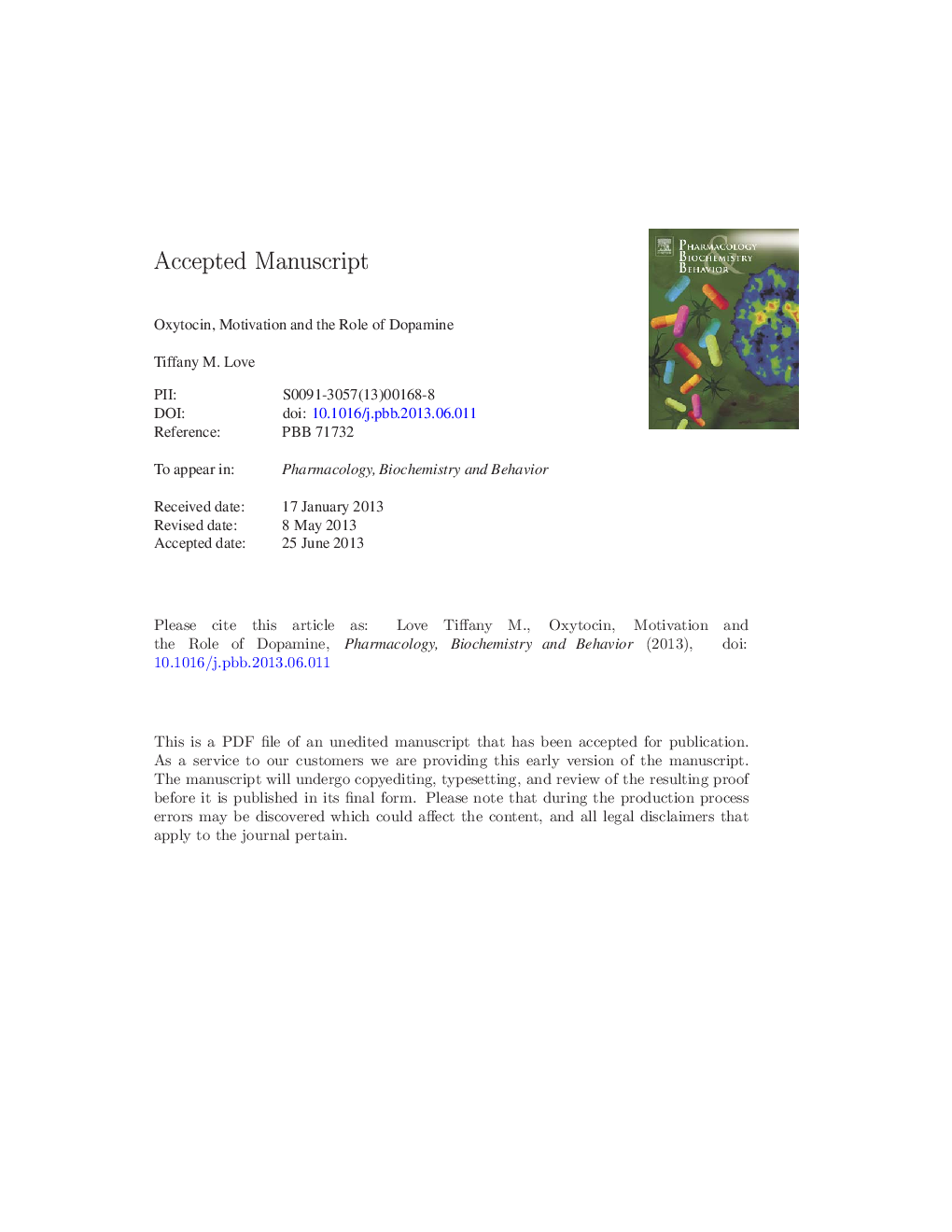| کد مقاله | کد نشریه | سال انتشار | مقاله انگلیسی | نسخه تمام متن |
|---|---|---|---|---|
| 8351277 | 1541865 | 2014 | 47 صفحه PDF | دانلود رایگان |
عنوان انگلیسی مقاله ISI
Oxytocin, motivation and the role of dopamine
ترجمه فارسی عنوان
اکسی توسین، انگیزش و نقش دوپامین
دانلود مقاله + سفارش ترجمه
دانلود مقاله ISI انگلیسی
رایگان برای ایرانیان
کلمات کلیدی
ترجمه چکیده
هیپوتالاموس نوروپپتید اکسیتوسین بیش از یک قرن توجه دانشمندان را به خود جلب کرده است. درک عملکرد تریاک اکسیتوسین در طول سال ها به طور قابل ملاحظه ای از یک پپتید ساده شناخته شده در القاء انقباضات رحمی و خروج شیر به یک نورومودولاتور پیچیده با توانایی برای شکل گیری رفتار اجتماعی انسانی گسترش یافته است. دهه های تحقیق توانایی اکسیتوسین را برای افزایش فعالیت های پیچیده اجتماعی از جمله پیوند جفت، فعالیت جنسی، ترجیحات وابسته و رفتارهای والدین مشخص کرده است. مکانیسم دقیق عصبی تحت تاثیر اکسی توسین در چنین رفتارهایی فقط درک شده است. تحقیقات نشان می دهد که اکسیتوسین با روش های عصبی مسئول پردازش محرک های انگیزشی مرتبط با یکدیگر ارتباط برقرار می کند. به طور خاص، اکسیتوسین به نظر می رسد که فعالیت دوپامینرژیک را در سیستم دوپامین مزوکورتیکولیمبیک تاثیر می گذارد، که نه تنها برای رفتار پاداش و انگیزه، بلکه برای بیان رفتارهای وابسته نیز اهمیت دارد. گرچه بیشتر کارهایی که در این زمینه انجام شده است با استفاده از مدل های حیوانی انجام شده است، مطالعات متعدد نشان می دهد که روابط مشابه در انسان دیده می شود. به منظور معرفی این موضوع بیشتر، این مقاله شواهد اخیر را بررسی می کند که اکسیتوسین ممکن است برخی از اثرات اجتماعی-رفتاری خود را از طریق تاثیر آن بر شبکه های انگیزشی اعمال کند.
موضوعات مرتبط
علوم زیستی و بیوفناوری
بیوشیمی، ژنتیک و زیست شناسی مولکولی
زیست شیمی
چکیده انگلیسی
The hypothalamic neuropeptide oxytocin has drawn the attention of scientists for more than a century. The understanding of the function of oxytocin has expanded dramatically over the years from a simple peptide adept at inducing uterine contractions and milk ejection to a complex neuromodulator with a capacity to shape human social behavior. Decades of research have outlined oxytocin's ability to enhance intricate social activities ranging from pair bonding, sexual activity, affiliative preferences, and parental behaviors. The precise neural mechanisms underlying oxytocin's influence on such behaviors have just begun to be understood. Research suggests that oxytocin interacts closely with the neural pathways responsible for processing motivationally relevant stimuli. In particular, oxytocin appears to impact dopaminergic activity within the mesocorticolimbic dopamine system, which is crucial not only for reward and motivated behavior but also for the expression of affiliative behaviors. Though most of the work performed in this area has been done using animal models, several neuroimaging studies suggest similar relationships may be observed in humans. In order to introduce this topic further, this paper will review the recent evidence that oxytocin may exert some of its social-behavioral effects through its impact on motivational networks.
ناشر
Database: Elsevier - ScienceDirect (ساینس دایرکت)
Journal: Pharmacology Biochemistry and Behavior - Volume 119, April 2014, Pages 49-60
Journal: Pharmacology Biochemistry and Behavior - Volume 119, April 2014, Pages 49-60
نویسندگان
Tiffany M. Love,
